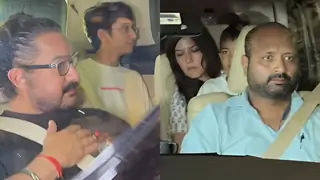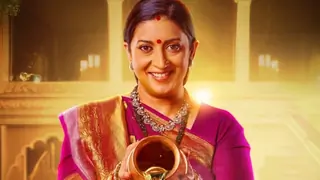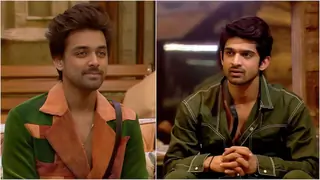Folks,
For those puzzled by the title, a curate's egg is good in parts. So it was with the episode today.
Jodha: She gave me a pleasant surprise by displaying a remarkable and unexpected degree of both good sense and pragmatism. First, she was careful not to alarm Rahim in any way, or give him any indication that anything was wrong or cause for alarm, and her gentle scene with the frightened child was utterly charming , Next, she decided not to take Mahaam head on, or go to the Shahenshah and accuse Mahaam of the crime till she had accumulated solid sakshya. She realises that Rahim's evidence would not be enough, nor even that of the dibbi alone. True to type, she keeps Moti fully in the loop.
She does utter a few predictable and angry phrases about never giving her kshama to either Mahaam, for the disgrace she had brought on to the Amer royals and on Amer itself, or the Shahenshah, for having destroyed her sister's chance of happiness because of his vivekheen nirnay. But by now one is so used to these fulminations that one hardly notices them!
There were 2 noteworthy omissions in this peroration.
- One, Jodha seems not at all bothered by the fact that Ratan Singh was a shelterer of dacoits who preyed on innocent people, and was in effect a dacoit at one remove himself, and thus hardly good husband material for Sukanya.
- Two, she never mentions the death of Jalal's baby as something for which she would not forgive Mahaam.
Having made such an impressive start, Jodha then proceeded to muff her lines and muck things up. The cardinal rule in investigations where the evidence against the suspect has not yet been sewn up is NOT to let the suspect get the least whiff of his/her being under suspicion. For an alerted suspect will naturally move heaven and earth to fudge or destroy the evidence, and perhaps even get rid of the witness(es). All the more reason then, when the suspect is the redoubtable Mahaam Anga, as poisonous as a rattlesnake and as quick to strike from her position of power as the Wazir-e-Aaliya, the quintessential insider in Agra palace intrigues.
So what does apni Jodha do? She seems suddenly bitten by the show off bug, and summons Mahaam to the royal kitchens for what was obviously intended to be a cat and mouse game of veiled insinuations, culminating in a direct accusation against Mahaam. What was totally unclear in this exercise - where Paridhi did very well, with her large, limpid eyes reflecting the mood of each moment beautifully - was what it was supposed to achieve, other than giving advance warning to that purani khiladi Mahaam.
At that point Jodha's script, whatever it was, goes awry, for the wannabe mongoose is suddenly attacked by the rattlesnake. Mahaam Anga seizes the bit in her mouth, like a runaway horse, and hustles Jodha to meet the Shahenshah.
It does not seem that Jodha realises her mistake in precipitating matters, for she precedes Mahaam to Jalal's rooms with her head held high and with every appearance of confidence. So much so that even Mahaam is shaken for an instant, wondering what proof Jodha might have against her.
But once in the presence of a preoccupied Shahenshah, when Jodha does not offer anything - neither an accusation nor evidence - Mahaam realises that Begum Jodha's cards are weak. She then does her number on Jalal to such effect that the tables are turned against Jodha, at least for the present, as Jalal glares at her over Mahaam's head, as he holds her in a comforting embrace.
Mahaam has the advantage of having had a dry run for this kind of self-exculpatory lamentation with Adham the other day, but she outdoes herself this time. The woman's ability to weep so copiously at the drop of a hat never ceases to amaze me. Jalal does not stand a chance under this deluge of high emotion from his Badiammi. Neither does Jodha.
One presumes that the Rahim angle is brought out after Ruqaiya, with a mind as sharp as a steel trap, gets into the act, and, if the SBS segment is correct, it ends up discrediting Jodha thoroughly. Again only for the present, but the matter seems likely to drag on for a while yet.
That it comes to this sorry pass after that serendipitous revelation by Rahim does no credit to Jodha. It could have been so easily avoided, and moreover, it has definitely made it much more difficult to pin Mahaam down.
Jalal: He does himself proud throughout. Setting aside his cares of state - Minister Shamsuddin has a whole laundry list of problems for him about disaffection in various parts of the empire - Jalal still receives his father in law promptly and with respect.
In his scene with Bharmal, Jalal shows that he is that rara avis, an emperor who has the humility, the candour and the good sense to openly acknowledge his mistake, accept a reproof from his father-in-law, request him not to take it personally but as something due to reasons of state, actually seek his advice, and promise to take it in good part and not to repeat his mistake. I cannot think of any other monarch as powerful as he is who would do even a fraction as much, capping it by going to see Bharmal off at the gates of Agra Fort. He does not let his imperial ego stand in the way of his desire to make amends for the wrong he has done, and that is both admirable in itself and very rare, both in his era or in any other.
Bharmal, worried about his family's reputation, goes into a spiel about choti and badi patthar ki lakeer, and his desire that Jalal should go down in history as a just king by repairing the injustice done to his innocent children by a greater act of justice. I could not make head or tail of what he was proposing, nor, I suspect, could Jalal. Nor, come to think of it, Bharmal himself, though he was carrying on as if he was the direct descendant of Manu the Lawgiver himself.
Jalal of course does not remind him of his folly in contracting an alliance for Sukanya with a bandit masquerading as a prince. Nor does he point out that while Jodha and her brothers might have turned out to be innocent in the end, the evidence against them was so strong that their being held under nazarband was not a whim but natural for so serious a crime.
Listening silently to Bharmal's vainglorious pronouncements that he could have taken out his sword and stood against Jalal - we all remember what happened the last time Amer stood against Sharifuddin, and also why Bharmal effectively forced Jodha into this marriage - Jalal does not permit himself even the smallest of knowing smiles. In his place, I would have smiled overtly, so incredibly foolish did it sound.
Instead, his eyes lowered half the time in overt awkwardness, Jalal nonetheless looks Bharmal full in the face, and without openly apologizing for his mistake (which an emperor cannot, any more than a government does these days when it eventually releases the wrong murder suspect) , he does everything just short of that.
Rajat is superb throughout this scene, with every fleeting nuance crossing his face reflecting the varying emotions he feels.
I was left puzzled as to why Jalal goes so far and bends so much to placate Bharmal. That he was in the wrong means nothing; powerful kings do not even acknowledge their mistakes, not to speak of showing their regret and their desire to make amends. They would see any of this as a sign of weakness, to be avoided at all costs.
Even when Bharmal says, when bidding farewell and in response to Jalal's wanting to extend the hospitality of Agra to him once again, that he hopes that Amer will always be able to stand with Agra, there is not even a flash of anger at such impertinence from the king of a tiny principality that Adham or Sharifuddin, given a free hand, could flatten in three days. Is it that Jalal is so weighed down by regret, or is it that he does not want his experiment with the Rajputs to fail prematurely? Probably both, with the Jodha factor as a supplementary tadka, but either way, the depth of his evident desire to make amends was surprising.
All the more so when Bharmal too talks only of restoring the lost reputation of Amer and does not say a word about the tragic loss of the emperor's child. Plus, both he and his daughter seem to have a fancy for the word vivekheen, and Bharmal uses it to Jalal's face. No other emperor, or even a plain son in law, would have stood for it. Most would have reacted harshly, which would have been no more than Bharmal deserved.
The prolonged love feast between Bharmal and the predictably gushing Hamida Banu during the farewell was enough to set even the most tolerant king's teeth on edge -especially when Bharmal talks of feeling at ease in Amer because Jodha has her as support in Agra. Any average son-in-law, even a Rajput one, would have reacted sharply and said something cutting in reply. But not our Jalal, though he is clearly far from pleased, either with Bharmal or with his Ammijaan. And no wonder.
It is probably the accumulated exasperation of his time with Bharmal and Hamida that primes Jalal for a near explosion when Jodha and Mahaam Anga land on him, and Mahaam'a operatic aria is played out with full force. Tomorrow will show how far and how sharply he reacts, especially given that Mahaam has managed to reduce Jodha's (as yet unstated) accusation from that of a deliberate murder to one of negligence.Par lakshan achche nazar nahin aate. Kanha is due for another round of vociferous complaints from his mahaantam bhakt.😉
L'affaire dibbi threatens to drag on and on, while the tiger seems, alas, to be far, far away as yet!😉
Shyamala B.Cowsik


































364